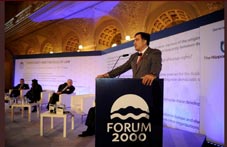Saakashvili Speaks on Rule of Law in Prague
By Messenger Staff
Wednesday, October 12

In his address, the president talked about Georgia’s situation regarding criminality and corruption and highlighted that eight years ago, Georgia was basically a criminalized failed state, a dying economy, a country shackled by corruption.
After the revolution, according to Saakashvili, a new young leadership carried out a number of reforms in the country whose goal was “the edification of a European democratic state in Georgia.”
“After one day in office, we discovered that revolutions are not only, not even mainly about the crowds gathered in the streets, they consist essentially in the long and difficult process of reforms and institution building that follows the uprising,” he said.
Saakashvili said that his government did not succeed in everything and they had significant shortcomings and made mistakes.
“Our model, combining legitimacy and legality, is neither perfect nor necessarily transferable to Arab nations or even other countries of our region, but everybody can find in our experience a general message of hope: radical changes are possible,” the president stated.
Summing up his speech, Saakashvili identified three issues:
“First, as I said, no matter how beautiful and moving the popular uprisings are, the real revolution consists more in the long and difficult process of reform that follows Second: only a whole-of-government and whole-of-society approach to reform can bring tangible, enduring results. The reforms of the judiciary, police, tax collection, customs, political class, electoral code, or education system should not be implemented individually, but as part of a complete project of social transformation. Third, and here we might encounter differences with the Middle East, one of the things that matters most in Georgia is this: our people are united around the common goal of joining the transatlantic, democratic community of states—of membership in the European Union and NATO,” he said.
